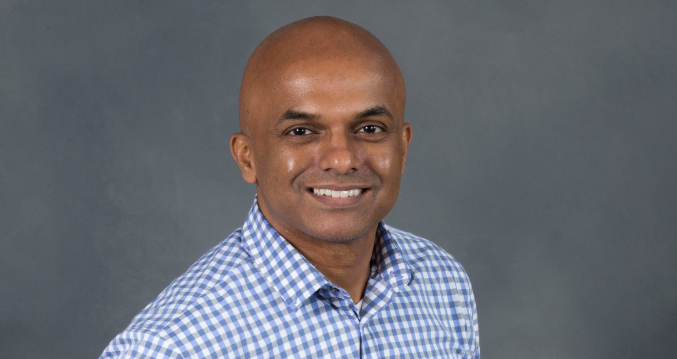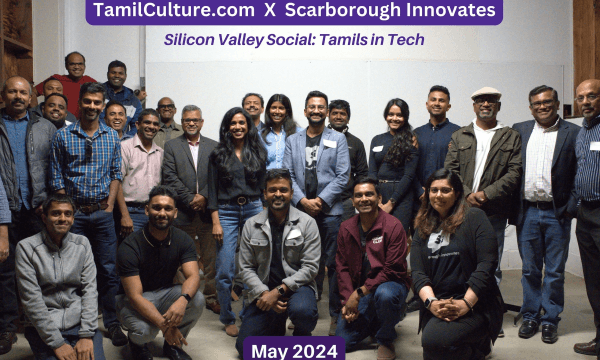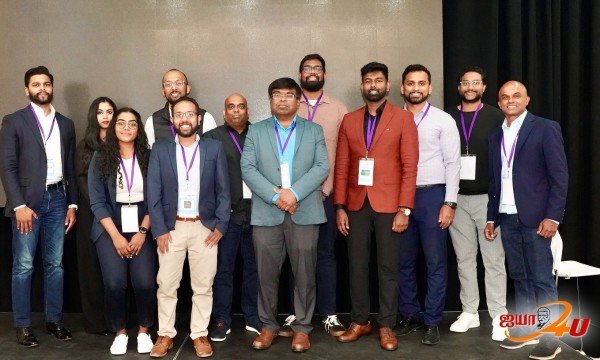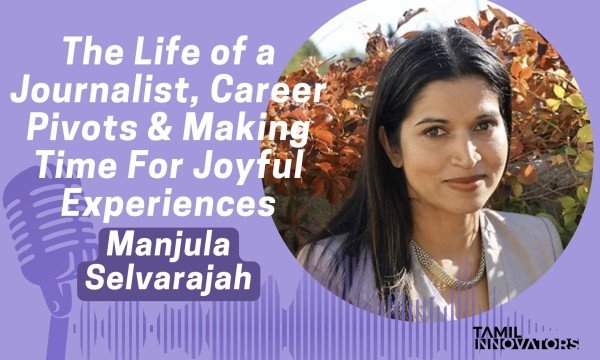
___
***Are you or someone you know in the global Tamil community doing great things? We'd love to feature them: FILL OUT THIS FORM ***
Network & collaborate with Tamil Changemakers from around the world. Request to join our private LinkedIn community here.
___
Mohan Markandaier is a serial entrepreneur with multiple successful exits. He co-founded Pulse Voice in 1996 which was acquired by Enghouse in 2009. Leveraging the financial freedom and over a decade worth of operator experience, Mohan co-founded Good New Ventures to help promising companies accelerate their growth with both money and mentorship.
Tell us about how the idea for Pulse Voice came to be, how the founding team came together and how you grew the company before it got acquired.
The four founders are long-time friends (all engineers, all Tamil) working in the Telecom industry. From our work experience, we realized that building voice applications on existing platforms were extremely complex and very expensive. We decided to build a platform based on a PC and Windows operating system that enabled developers to easily build and deploy voice applications from a user friendly graphical interface that significantly reduced the total cost of ownership for our customers. We started building our platform in our basement in 1996, designing them specifically to one of our customer’s requirements and got our first installation in Europe. As conservative engineers, we bootstrapped the company to grow organically based on cash flow and managed to be profitable every year. Sometimes I wonder if we had raised outside capital and invested heavily, would we have grown faster and become a leader in our space. On the other hand, our organic growth allowed us to survive and even thrive during the dot com bust in the year 2000 and the financial downturn of 2008. At the time of our acquisition by Enghouse in 2009, we had customers in 40 countries and also happen to be the best year financially since we founded the company.
How did the acquisition by Enghouse come to be? Also, tell us what the experience of getting acquired looks like briefly.
Three years prior to our acquisition, we realized the need to bring on external advisors and mentors to help us to scale our company. We established an advisory board with accomplished senior executives from our industry. These executives brought extensive outside perspective that not only helped us triple our revenue but also enabled us to explore new opportunities for growth. We contemplated raising capital to grow the company ourselves, or alternatively merge with another company and become a more dominant player in the industry. As luck would have it, the Chairman of our advisory board ran into someone at the airport, in the washroom of all places, and that conversation led to us having a meeting with the CEO of Enghouse with the rest being history. The process of being acquired was certainly exciting but involved some anxiety as well. The partners and I were excited, as this is something we had planned for the company sometime in the future and it was becoming a reality. The anxiety was predominantly around how the integration would work – who would stay with the company and who would be moving on. Overall, the decision was the right one and we were able to celebrate the achievement and have no regrets.
What made you decide to sell the company (Pulse Voice) that you had been building with close friends for over a decade instead of continuing to try to grow the company?
Each of the four partners intrinsically had different strengths that we brought to the table. We also had very different personalities. Together, we had agreed to a unified commitment to identified goals and a willingness to work together to achieving them without compromising our friendship. Certainly, we had our share of healthy debates and arguments during strategy sessions, nevertheless we focused on ensuring open communication among us and all decisions were made in the best interest of the company. Having worked together for more than a decade, an opportunity was presented to us that not only afforded us financial freedom but also provided an avenue to explore other possible ventures based on our individual aspirations. After the exit of Pulse Voice, the four of us continued to work together in other business endeavours and remain good friends to this day. Looking back, we all agree that the first exit paved the way forward for all of us to explore different paths and opportunities, each would agree that we are extremely happy with our choices and our lives as a result.
In recent years, there’s been a glamorization in the start-up world around raising money and growth at any costs, how do you feel about this?
I am a strong believer in start-ups and in entrepreneurship as I believe it leads to innovation that pushes boundaries of the status quo. Taking big bold risks supported by vision and investing heavily both emotionally and financially in an environment where there is a high rate of failure, takes true courage and resilience. I may be biased but entrepreneurs of start-ups need as much support as possible as what they are endeavoring to do, is an extremely difficult thing to accomplish. With respect to raising capital, measuring the success of a company on how much capital they have raised is an incorrect barometer. Instead the focus should be on how effectively the company is solving a problem in a specific market and how well they are addressing the needs of their customers to attain market dominance in that space. In order to accomplish this fairly quickly, start-ups need capital at various stages. Capital from investors can be extremely valuable for product development, validate product market fit, and increase market share, all of which requires companies to continue to invest cash during these stages and it is the nature of any start-up.
How did Good New Ventures start and how do you differentiate yourself in the marketplace where companies (especially the good ones) have the leverage because getting money is not a problem for them?
Having been an entrepreneur for years with some successes as well as many failures, I always wanted to work closely with entrepreneurs by investing capital and providing mentorship wherever possible. I joined a not-for-profit Angel group out of Markham called York Angel Investors with the goal of meeting other like-minded Angel Investors to leverage their expertise and share the risk of making investments. This is where the Good News Ventures (GNV) partners met - at that time, all 3 partners combined had invested in many start-ups as Angel investors with few successful exits. Since we were all doing investing full time, we thought we should get together and start a fund. GNV fund was more of an evolution for us - where we can leverage our capital along with outside investors’ capital to invest larger funds in pre-seed and seed stage high growth tech companies predominantly based in Canada. We believe our key differentiator comes from our operator backgrounds with experience in starting a company from scratch and successfully exiting. With an entrepreneur-focused mindset, we support our companies, championing and cheerleading them so that they can increase their chances of success during the high risk stages. We leverage our Next Level Program where our network of partners help our founders network and establish connections, discuss strategies and receive guidance in dealing with specific challenges.
_____________________________
Related Articles:
- "The Tamil Creator Podcast (Ep.31): Luksimi Sivaneswaralingam – Award-Winning Kollywood Singer & Elementary School Teacher"
- "The Tamil Creator Podcast (Ep.30): Suresh Doss – Leaving A Successful IT Career To Becoming A Well-Known Food Writer"
- "The Tamil Creator Podcast (Ep.29): Indira Samarasekera - Former University President & Current Board Member (Of Several Large Market Cap Companies), Co-Authors Book To Help Create More Female"
- "The Tamil Creator Podcast (Ep.28): Ari Sooriya - Creative Extraordinaire: From TamilCulture.com to Teacher (And Everything In Between)"
- "The Tamil Creator Podcast (Ep.27): Bindi Bosses (Shyamla Eswaran & Ragavi Ragavan) - Australian-Based Dance Group Creating Social Movvement And Discussions Through Performance & Storytelling"
- "The Tamil Creator Podcast (Ep.26): Rick Selvarajah – UK-Based Professional MMA Fighter Turned Entrepreneur"
- "The Tamil Creator Podcast (Ep.25): Jenushika Jeyakumaran – Legal Innovator & Recent Grad Who Co-Founded Tech Company Aleri To Make Trial Preparation Easier For Lawyers"
- "The Tamil Creator Podcast (Ep.24): Nelson Sivalingam - UK-Based Serial Entrepreneur (Tech & Food), Podcast Host & Award-Winning Filmmaker"
- "The Tamil Creator Podcast (Ep.23): Maya Bastian - Investigative Video Journalist To Award-Winning Film Director (Including 2021 Cannes Festival Entrant)"
- "The Tamil Creator Podcast (Ep.22): Sathish Muneeswaran - Personal Trainer Changing The Conversation In The Tamil Community Around Strength Training, Fitness & Healthy Eating"
- "The Tamil Creator Podcast (Ep.21): Shayna Mehta – Aspiring Doctor & Award-Winning Div 1 Basketball Player Challenges The Notion That Brown Girls Can't Ball"
- "The Tamil Creator Podcast (Ep.20): Anand Venkateswaran – Crypto Believer Behind $69M NFT Purchase & Co-Manager of Metapurse, World's Largest NFT Fund"
- "These Tamil Entrepreneurs Share How They Grew Their Side Hustles"
_____________________________
Why did you decide to invest your time full-time in becoming an investor through Good News Ventures?
I am extremely passionate about start-ups and entrepreneurships in general. Over the years, I have been fortunate to have had successful outcomes both as an entrepreneur and investor. Investing in early stage is certainly high risk and it requires one to have a long term outlook as it takes a while to build a successful company. However, seeing how companies are able to disrupt various industries to make a significant difference in those markets, is extremely rewarding. With risks taken, come financial returns for our investors and partners. This makes it easy for me to continue to invest time as an investor and a fund like GNV provides a vehicle to formalize a structure and follow processes to be an effective investor.
Can you briefly describe how Good News Ventures makes money? Can you describe the structure of Good News Ventures in terms of managing partners (GPs) and investors (LPs)?
Most typical Venture Capital funds in North America are set up as a GP/LP structure. If I were to simplify the setup, General Partners (GP) are responsible for the day to day running of the fund – sourcing companies to invest, doing due diligence, negotiating term sheets, making an investment, and working closely with those companies to help them succeed. In addition, GPs manage the relationships with their investors (Limited Partners) providing them with ongoing communications including regular reporting on the fund’s performance. Limited Partners are accredited high net worth individuals who are investors on the fund and are not involved in the management of the fund. GPs charge a management fee and take a portion of the profit, usually 2% and 20% respectively.
Have there been any investor opportunities that you had an opportunity to invest in and missed out on?
As investors, admittedly there are misses on some good opportunities. However, with experience, we are able to better evaluate founders, their businesses and market opportunities. As we are investors in very early stage companies, it is extremely hard to be always right as there are a number of key factors that goes into any start-ups and its success not withstanding their product, market and the team. We believe timing plays a big role and sometimes, have to stay long enough to get lucky.
Where do you see yourself in the next 3-5 years?
As we speak, we are launching our next fund and over the next couple of years we will be in the midst of deploying capital and continue to support our 25+ companies that are already in our portfolio and with the addition of 25 more from the new fund, it is going to keep us extremely busy. My plan is to continue to do what I am passionate about, which is to support our founders and at the same time help the overall start-up ecosystem.
What is a failure you’ve experienced in the last 5-10 years that you’ve learned the most from?
As an entrepreneur, no one failure stands out in my mind as they are part of the journey. One is not defined by the failures they experience but rather by the manner in which you get up. Over the years, I have learnt most is that mistakes are inevitable, they are simply opportunities to learn and grow. With the lessons learnt from mistakes and failures, it is important to focus on the positive and build on the wins.
In terms of your personal legacy, in a few sentences, describe how you want to be remembered by your family and friends?
For the better part of my life, I have been committed to making a difference in the lives of others. I would like to be remembered as a good man who had a positive impact as a husband, father, friend, co-worker and community leader. My goal is to live a life that exemplifies my best qualities to support others achieve their successes.
Who is one person from the global Tamil community and one person that isn’t Tamil that you admire and why?
I admire many people both within and outside of the Tamil community. Many have been mentors and role model both on the personal and business side at different stages of my life. The Tamil community is an incredible example of perseverance as most include overcoming enormous hardship. My family is no different. My late-father was one of my greatest personal role models. He came to Canada as a refugee and even though he was a qualified teacher, he worked several odd jobs to support the family. He made it possible for all four of his children to attain university degrees and pursue their chosen careers. At the age of 60, he enrolled at the University of Toronto to obtain his accredition and at the age of 70, opened a private after school tutorial services with an enrollment of over 200 students. He believed in hard work, positive thinking, always help others, and living with passion. He will forever be one of my most influential role models of my life.
What is a great business idea that you would be working on if you weren’t focused on Good News Ventures and you were 10 years younger?
I have always wanted to be an entrepreneur and having done that, I now enjoy working with entrepreneurs. Over that past years, working with start-ups I have learnt so much, even more than when I was an entrepreneur - evolving markets, customer behaviour changes/priorities, social conscience and much more. As I evolve and grow, I am excited that I am living my life with profound purpose and passion. If anything, I wish I could have started this journey ten years ago right after we exited from Pulse Voice.
What do you think you would tell 16-year Mohan looking back?
When I was younger, life was different with a lot of hardship. I would tell my 16-year old self to continue to work hard and persevere, as it is not in vain. I would remind him to be positive and passionate. I would assure him that he is heading down the right path, a balanced and fulfilling life and career in the company of great family and friends.
How would you describe your dream life?
I would say I am living a dream life. I am incredibly fortunate to have a family life that I love and I am proud of, while having a career I am passionate about. I am especially happy that I get to spend quality time with my teenage boys and hopeful that I have the right influence on them. My wife and I have a great relationship, she is always there for me and we fully support of each other both personally and professionally. There is absolutely nothing I would change about my life.
What is your favourite book(s) you've read recently or a podcast(s) that you've listened to recently that's had an impact on you?
I recently read the book by Ben Horowitz, "The Hard Thing About Hard Things". Ben Horowitz is the founder and General partner at Andreessen Horowitz and a very successful entrepreneur prior to that. Reading this book provides different insights and perspectives about how difficult is to start and grow a successful business and that you are not alone.
What is a new belief, behaviour or habit that has most improved your life?
As a fast paced, type-A personality, I am focusing on slowing down and trying to understand other peoples’ perspective without pre-judging.
If you were given $1 billion, how would you allocate the money to change the world?
This is an easy question to answer as an investor in early stage companies: I would definitely invest in aspiring entrepreneurs globally with a focus on those with environmental and social impact. I will focus on building privately run infrastructures for start-up ecosystems to access capital to innovate and commercialize in developing countries that lack the right resources.
How would you describe the impact that the Toronto Tamil community has had on you personally and your business?
Since coming to Canada in 1989, the Toronto Tamil Community has had a tremendous impact on me. As a community, we endured severe discrimination and brutal war. After immigrating to Canada, we certainly had our challenges. Today, we have a strong sense of community not only as Tamils but as Canadians. I am proud of the Tamil community and their commitment to growth and contribution of the Canadian community at large. With continued hard work, we are quickly becoming one of the most educated and successful communities, not just in Canada but around the world.
Do you think affluent members of the Tamil community contribute their fair share to philanthropic initiatives outside of the community? Any changes you’d like to see?
There are many members of our community who contribute to various causes and initiatives. It’s important to remember that most Tamils haven’t been in Canada for long – even with that, many look to contribute both within and outside of the community. I strongly believe that as time passes, the community will grow, evolve and attain much success and in turn will to support causes that are important to them.
What is your favourite Tamil food (meal or dessert)?
Mutton Kottu Roti.
What is your favourite Tamil movie?
Nayagan.
What does Tamil culture mean to you?
I am a proud Sri Lankan Tamil. I am proud of our language, culture, arts, music and way of life. Even the struggles we faced in Sri Lanka and the struggles of adopting to a new country is a part of our history and our legacy. I belong to an incredible community and I am very excited to witness what we are going to accomplish in the future.
**Looking to create your love story? Join the other couples who have dated and married through myTamilDate.com!***
"myTamilDate Success Story: It Was Love At First Sight For Madhu & Niya"
"myTamilDate Love Story: Jenani & Nav Found Each Other At The Right Time And Right Place In Life"
"myTamilDate.com Love Story: Tharshi & Ravi Found Love During Lockdown"
"How France Met Canada: A MyTamilDate.com Love Story"
***CLICK HERE to listen to us on Spotify!***
Related Articles:
- Tamil Innovators: Thanuska Subramaniam on Finding Success in the Creator Economy
- Tamil Innovators: Prajeeth Balasubramaniam Discusses Startups & Investing in Sri Lanka
- Tamil Innovators Spotlight: Nivatha Balendra On Surviving Cancer & Building a CleanTech Startup
- Separated From Family During Sri Lanka's Civil War, Ganesh Thava Overcomes Childhood Adversities To Find Success As Actor, Writer & Director
- Singaporean-Born, Canadian-Raised, Decolonial Racial Equity Educator Channdika Thayver Delivers Powerful TEDx Talk On Racial Equity In The Workplace
- "Tamil Innovators Spotlight: Theban Ganesh Discusses Building a Web3 Company, Improving Healthcare Through Blockchain, Successful Exits"
- "Karthy Subramaniam Co-founded Fast Growing Sauce Company LITS as a Tribute to a Childhood Friend"
- "Elite Athlete, Coach, Future Chiropractor & Entrepreneur Abirami Shanmugaratnam Is Making Waves In The Athletic Performance Industry"
- "Toronto's OG Food Writer Suresh Doss Is Using His Reach And Voice To Help Engineer A Comeback For Beleaguered Restaurant Industry"
- "Ballet And Kung Fu Trained Australian Actress & Writer Rubi Balasingam Is Promoting Tamil Voices In Aussie TV And Film"
- "Yathusha Kulenthiran's Marketplace For Environmentally Sustainable Palmyra Products Empowers Female Artisans In Sri Lanka"
- "Australian-Tamil Entrepreneur Sujan Selven Is Creating Economic Opportunities For Remote Villages In Northeast Sri Lanka Using Upcycled Devices & Improved Connectivity"
- "Crypto Tinhorn & Former Journalist Anand Venkateswaran Talks About Buying A $69M Digital Art Piece, Collecting Stories & Catalyzing Change"
- "Tamil Innovators Spotlight: Abarna Raj, CEO of Australian Social Startup Palmera, Is Tackling World Poverty"
- "Tamil Innovators Spotlight: Tea Drops CEO & Founder, Sashee Chandran"
- "Tamil Innovators Spotlight: Knowledgehook's CEO, Travis Ratnam"
- "Danny Sriskandarajah's Journey From Rural Sri Lanka to CEO of Oxfam Great Britain"
- "The NBA Bubble: Dr. Priya Sampathkumar Helped Make It Happen"
- "These Tamil Founders Behind Agritech Startup Dunya Habitats Want To Alleviate Food Security Globally"
- "Angel Investor Jay Vasantharajah On Building His Portfolio One Day At A Time"
- "Breaking Into Hollywood: Meet Tamil-Canadian Actor Vas Saranga"
- "Meet Rebecca Dharmapalan - Filmmaker, Legal Scholar, And Activist"

























